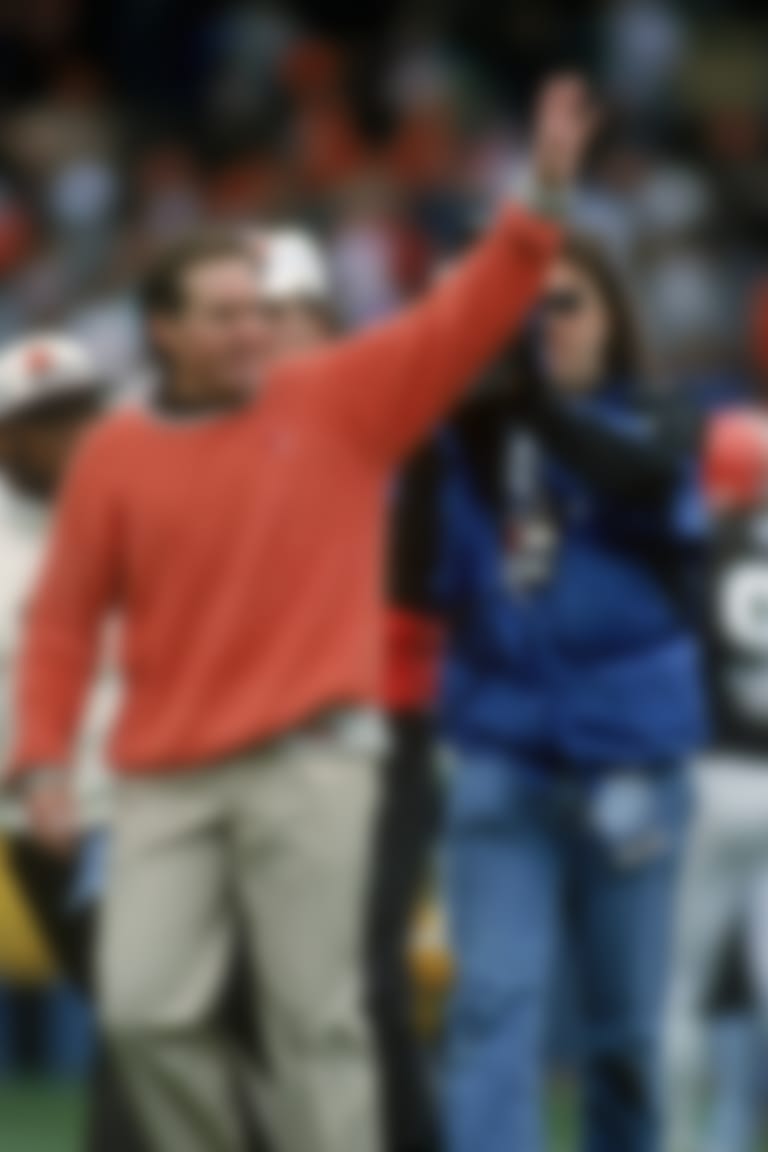In 1992, Bill Belichick was an unproven coach trying to rebuild the Browns -- but that didn't keep him from reaching out to a college student in search of direction
By Marc Sessler | Published Oct. 3, 2016
We're rolling across the middle of America in the anti-lush confines of a wretchedly old, rose-colored Chrysler Cordoba. The wayward craft completely fails the eye test, but nobody's complaining. It was our only way to get to Cleveland for tomorrow's Browns-Broncos tilt.
Karen, the driver, and one of my only friends at Miami of Ohio, borrowed this disgrace-on-four-wheels from a friend on campus. Only she is allowed to drive it, which pleases me, because I don't trust the vehicle and I'm a wholly disastrous driver.
Karen is a year older than me and doubles as my dorm RA at Miami. She's blonde, kind, humorous, a good storyteller and a fellow Browns fan. She's also dating the guy sitting next to me in the back seat, Ryan, who is way taller than me, comfortable in his own skin and roots for the Broncos. It makes little sense to me how a Browns fan could ponder a romantic relationship with a Broncos fan, but I own zero say in the matter. The fourth passenger -- a guy whose name escapes me -- is riding shotgun and heading home for the weekend to see his parents.
The date is Sept. 26, 1992. The Ohio morning is sunlit and the car's open windows invite the scent of freshly chopped grass along Interstate 71. Also: the smell of smoke.
Ryan notices it first. The chalky fumes drifting in, mixing with our conversation. The vehicle in front of us is trouble-free. Behind us, though, Ryan and I spot chaos: a dank, smoky plume funneling skyward from the back of our hideous Chrysler.
"Karen," I say. "You might want to turn around."
Karen surveys the growing madness in the rear-view and yanks the vehicle to the side of the road. The four of us tumble out of the car, now spitting gray haze and mist from multiple portals. I think about my possessions -- a backpack filled with favorite books, notepads, journals and my camera -- and rip open the door to grab my stuff.
We throw our belongings onto the wide lawn beside the highway and watch in awe as the tortured auto struggles to survive. A kindly trucker pulls over to help. He surveys the vehicle and says something I definitely don't understand about fuel injectors and coolant.
Then a thunderous popping sound as the auto's belly explodes into flames, spewing streams of oil and bright green fluid. The Chrysler Cordoba, borrowed from Karen's unknowing friend, is burning to the ground two hours south of Cleveland.
All this effort and madness for the Browns, who refuse to return the favor. The next day, in front of 78,000 fans at old Municipal Stadium, the team is shut out 12-0 by John Elway and the Broncos.
With Cleveland quarterback Bernie Kosar nursing a broken ankle and backup Todd Philcox ruled out with some tedious injury, the recently signed Mike Tomczak completes just nine passes for 75 yards as I openly question my existence.
We'd made our way from the burnt car to Karen's parents' house in suburban Cleveland the night before, thanks to a tangled string of rides -- but the deep-sixed Chrysler was the least of my worries.
In the autumn of 1992, my mind and heart were given entirely to the concept of the Browns winning a Super Bowl under an embattled, unproven coach by the name of Bill Belichick.
Belichick was named coach of the Browns on Feb. 5, 1991. He came to Cleveland after a celebrated run as the defensive coordinator of a Bill Parcells-led Giants team that had just won its second Super Bowl under the regime with a wild 20-19 victory over the Bills, capped by Scott Norwood's infamous "wide right" missed field goal that sunk a knife into Buffalo's heart.
Cleveland had endured its own recent heartbreaks, suffering through "The Drive" and "The Fumble" in back-to-back, soul-spinning losses to Elway's Broncos in the 1986 and '87 AFC title games. The Browns lost a third conference championship to Denver in 1989 -- a blowout deserving no nickname -- before totally bottoming out in 1990 to finish 3-13, handing Cleveland the second overall pick in the 1991 NFL Draft.

Belichick, two months after taking the Browns job, used the selection on UCLA safety Eric Turner, a devastating hitter who fit the new coach's desire to toughen the middle of Cleveland's defense. The roster he inherited was littered with aging players -- fading remnants of those late-'80s playoff teams -- putting Belichick under the gun to essentially rebuild the club from scratch.
As the son of a talented coach -- Steve Belichick, who helped revolutionize the team-building process with his pivotal 1962 book, "Football Scouting Methods" -- Bill took hold of Cleveland's front office, installing a player-picking paradigm that strived to unify how Browns scouts evaluated college players.
Belichick wanted hardworking, no-nonsense, uber-tough athletes who would thrive in the harsh elements of Northeast Ohio. The process would take years, which created issues with an antsy fan base yearning to get back into contention before Kosar, the team's beloved quarterback, ran out of gas.
When I fell for the Browns in the autumn of 1986 -- after watching them destroy Dan Marino and the Dolphins on "Monday Night Football" -- I had never even been to Cleveland. I lived in Connecticut, surrounded by classmates who rooted for the Jets and Giants. Those were the only two teams we saw on television outside of Monday nights, so I knowingly signed up for a franchise that I would barely watch live.
The Browns in the '80s were a fascinating Kosar-led club that knew how to score points and beat up teams with a white-knuckle style of defense that Cleveland could feel proud about. They operated as the center of my world.
My Sundays were spent glued to the television, praying for NBC to mercifully dip into its "10-minute ticker," the network's all-too-infrequent out-of-town scoreboard that served as my touchstone to the happenings along the shores of Lake Erie.
Life would sing when Bob Costas would cut into some dangerously dull Jets affair with an actual highlight out of Cleveland -- a blessing filled with brief, electrifying snippets of Earnest Byner dashing for yardage or Webster Slaughter beating press coverage for a heavy dose of real estate.
I would lie on the carpet also listening to WFAN, which, back then, produced an around-the-league-type show that cut live to various radio correspondents nestled in distant football stadiums, raucous waves of crowd noise layered behind them as they described one or two plays before the show marched on to the next venue. This program nearly sent my teenage body to the hospital on multiple occasions.
In what can only seem like foolish thinking to the reader, my decision to go to Miami of Ohio was based almost entirely on a desire to be closer to the Browns.
My plan after leaving home was cut-and-dried: whip through college and begin a career revolving entirely around Cleveland's football team.
At 17, I didn't know what that meant in detail. Maybe it meant coaching, or public relations, or covering the club for The Plain Dealer. I didn't know the path -- but I knew the Browns were my destination.
When I got to Miami of Ohio -- just four hours south of Cleveland in the tiny, lush town of Oxford -- I found myself deeply detached from the immense exuberance surrounding me. The freshman guys and girls who littered our rather puritan dorm environment seemed to be at ease in their new surroundings. Within weeks, we were being recruited by a rash of fraternities, touring their unkempt, alcohol-drenched compounds and hearing whispers about what would be required of us during the "rush" process.

I floated through these early weeks in a haze, drifting into isolation. I spent hours alone in stairwells, writing lonely letters to hometown friends and semi-insane missives to vastly disinterested ex-girlfriends hundreds of miles away.
On the Sunday morning I was meant to join some ponderous fraternity, I abandoned the process entirely and fled to a sports tavern in the heart of Oxford. It was Week 1 of the 1992 season, and I had come to Ohio for the Browns.
Kosar and friends fell to the Colts that day in depressing fashion. Still, I found myself diving deeper into fascination with Belichick. He unquestionably had a plan, and if the Browns were an unfinished product, they were also tough and no embarrassment.
I made the terrible mistake of signing up for Japanese in my first college semester -- telling myself dumbly that it was a good "business decision," as if I possessed even a remote clue of industry. This move haunted my every moment. Two days into university life, I was tasked with learning three separate Japanese writing systems -- Kanji, Hiragana and Katakana -- which served as unruly harassment for a person plagued hourly with the question: Why am I even here?
My second megaton mistake was registering for a deep-dive science class based on Ohio-area trees and shrubs, a subject matter that felt dangerously useless on every possible level.
The only enjoyment I found in the classroom that ill-fated autumn was a tantalizing course entitled "Football Studies 101," which seemed sent from God, despite being worth a measly half-credit.
It was flush with Miami of Ohio football players -- huge, monstrous humans who seemed seven years older than me -- plus maybe two girls and myself. Taught by head coach Randy Walker, who went on to coach at Northwestern before passing away in 2006, the once-a-week affair delved into coaching strategy and team-building tactics without asking me to learn a language that would set me up comfortably in Tokyo. It was a joy. I found it fascinating to be in the same room with a real, established football coach who took his craft seriously.
Walker treated me as an equal to his players. When he handed out assignments -- diagramming a famous college offense, for instance -- my instinct was to blow him away with a 40-page, nuanced exploration of the Single Wing. As part of the final assignment, we were tasked with reaching out to a real coach -- anyone -- to seek out their philosophy.
It could have been one of Walker's assistants or an old high school coach. I played football in high school, quite poorly, but had also burnt bridges with the staff after killing the team in a string of critical columns for the local paper the year before. Besides, my target was clear: Bill Belichick.
I got down to work on an overly long, gushing, uneven letter to the coach of the Browns. It included much of the nonsense I've shared here and operated as an appeal to what I believed was his mission in Cleveland, which I was largely guessing about in the pre-Internet dark age.
I shipped off the packed envelope, and suddenly, the world felt alive. While I watched my scant collection of college friends vanish into a wormhole of fraternities, sororities, "grab-a-dates" and bubbling social lives, existence for me was centered on one pivotal, make-or-break question: Would Belichick write back?
To my surprise and wonder, he did:

I carried this letter with me for weeks. To me, it was proof against the daily criticism Belichick was taking in The Plain Dealer and television media. Ripped for being aloof, distant and curt with the press, he had responded to me with care and compassion. Along with the letter, Belichick included a variety of in-house marketing materials and an example of the team's weekly schedule.
When I submitted this to Walker, it's fair to say he was taken aback.
That football class came to an end in December. I passed with flying colors, which somehow didn't impress my parents against the dark information that I had totally flagged Japanese -- I didn't even take the final, simply turning in a blank blue book -- and barely survived "Trees and Shrubs," which evolved into a horrifying adventure into deep botany.
I returned after the winter break determined not to fail another class. I vanished into solitude, spending hours alone in the library, destroying course assignments and reading books about New York crime sprees, European revolutions and American football.
I was thrilled to learn that historic Browns coach Paul Brown, in his autobiography, glowed about attending Miami of Ohio as a young man. Even if I felt lost on campus, it filled me with a sense of purpose.
The Browns ended that '92 season as a 7-9 team in third place of the old AFC Central. Still, I rode with the belief that Belichick was a craftsman imbued with a plan to turn the Browns into a sturdy and powerful team that would someday do what Paul Brown's squads had done.
I regularly read the day-old Plain Dealer in the library for shards of information from Cleveland's football scribes. With the 1993 draft approaching, I became convinced the Browns should select O.J. McDuffie, a wide receiver out of Penn State who I believed -- sight unseen -- would ignite Cleveland's offense.
In a wild bit of hubris, I penned a second letter to Belichick in March, urging him to consider the scouting recommendation of an 18-year-old college freshman who spent his days reading off-kilter historical novellas in a distant library.
Again, though, the coach described in the press as a moody crank responded:

Fast-forward to December 1994. I had transferred from Miami of Ohio to Ithaca College's radio and television school, and -- in a fit of young-adult madness -- transferred again the following year to American University in Washington D.C.
I was floating in a world of peak confusion, but Belichick's Browns were the opposite, by now looking like a contender. The coach, though, was seen by many as Public Enemy No. 1 in Cleveland after infamously releasing Bernie Kosar, a move that was blamed on "a diminishing of his physical skills." The transaction turned Belichick into an anti-hero in the city -- and toyed with my world view of the team -- but I was convinced that everything Bill did came with one grand purpose: winning.
His '94 team was the result of all the decisions he and the front office had gone out on a limb for: Instead of the aging veterans he inherited, this Browns roster formed a potent mixture of successful draft picks, proven veterans Belichick had coached as Giants and an athletic starting quarterback in Vinny Testaverde. The Browns raced out to a 6-1 start before finishing the year at 11-5 as a playoff participant.
Much has been written about Belichick's Patriots, but it all started in Cleveland, with a team that employed Nick Saban as defensive coordinator, a young Ozzie Newsome and Michael Lombardi upstairs, Kirk Ferentz tutoring the offensive line and secret agent Ernie Adams attached to the team under the perfectly vague, Belichickian title of "special assignments."
The team also featured a laundry list of future NFL headliners in Scott Pioli, Mike Tannenbaum, Jim Schwartz, Thomas Dimitroff, Phil Savage, Eric Mangini and George Kokinis.
The '94 Browns were the vision Belichick had promised, finishing as the NFL's No. 1 scoring defense under Saban by allowing just 12.8 points per game. They were a delight to watch on special teams, too, led by dazzling returners Eric Metcalf and Randy Baldwin and tackling machine Bennie Thompson, who foreshadowed the versatile brand of player Belichick would come to love in New England. The offense did just enough, with Testaverde directing an attack that relied heavily on running backs Leroy Hoard and Earnest Byner, the latter having returned to Cleveland as a fan favorite after winning a Super Bowl with the Redskins.
With Belichick's team preparing for a wild-card tilt against the Patriots -- a team coached by his former mentor, Bill Parcells -- I felt driven to reach out to Cleveland's coach one more time. Home for winter break and loafing around the house with my football-loving friend, Peter Acton, I decided to swing for the fences.
With Peter listening on an upstairs phone, I called "information" -- 411 -- from my basement landline for the digits to the Browns' complex in Berea. The info lady asked if I wanted to be patched through to Northeast Ohio, and I answered in the affirmative. It was time to fly.
Peter and I stayed silent until the call was answered by a front-desk secretary inside the building. I explained that I was a "friend" of Belichick -- a wild stretch -- and wanted to leave a message with the coach ahead of Sunday's showdown with the Pats.
The semi-perplexed aide tossed me through to another voice, who answered the phone cheerfully, announcing herself as Bill's admin.
"Hi. My name is Marc Sessler, and I'm a longtime Browns fan and, well, I just wanted to wish coach good luck against the Patriots."
"Hi, Marc," she said. "I remember your name. You wrote all those letters to Bill -- would you like to speak with him?"
Suddenly, I was too close to it all. What would I possibly have to offer Bill Belichick from a football perspective? Who was I? A wandering youth. Three colleges in three years, no real resume to speak of -- a searcher yet to find a thing.
"Actually," I said. "I don't want to bother him. Just give him my best for tomorrow, and thank him for what he's done for the Browns."
"Will do," she said.
Twenty-four hours later, Cleveland executed the Patriots 20-13 on New Year's Day 1995. The Browns were dismissed from the postseason one week later with a 29-9 loss to the Steelers and have not won a playoff game since.














